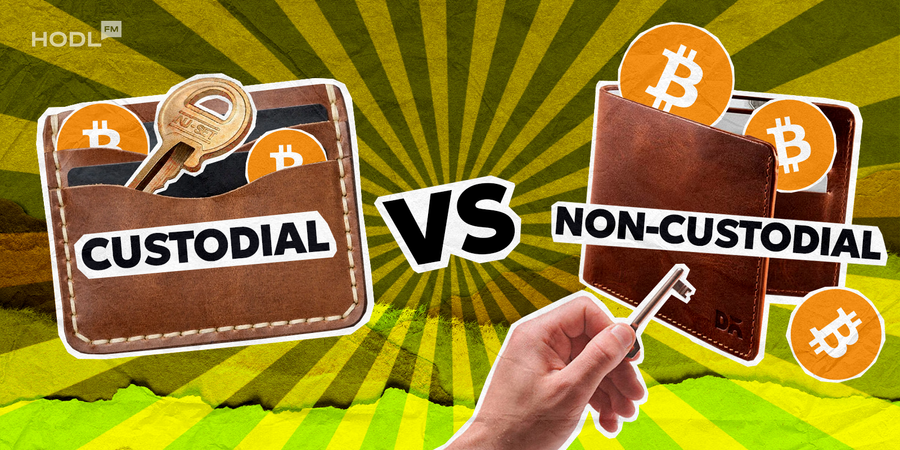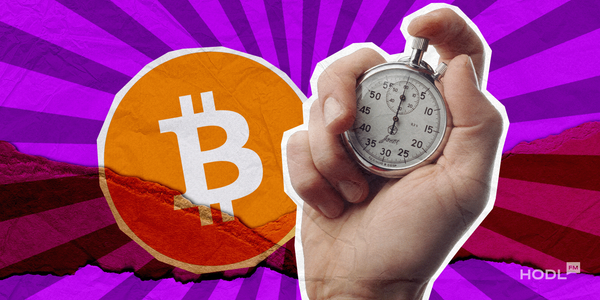Enter crypto wallets—a must-have for storing and managing your assets. But here's the kicker: these wallets don't actually store your crypto. Instead, they generate an address that locates your digital assets on the blockchain. Let's break it down, shall we?
The Basics of Crypto Wallets
Every crypto wallet comes with a public key and a private key. Think of the public key as your bank account number—shareable with everyone and used to receive funds. The private key, on the other hand, is like your secret password. It grants access to your funds and is important to keep safe.
Wallets fall into two main categories: custodial and non-custodial. But what sets them apart, and which one is your best bet?
Custodial Wallets: The Third-Party Guardians
A custodial wallet is like having a bank manage your funds. A third party, often a crypto exchange, holds your private keys and manages your assets. This setup is great if you don't want the headache of managing keys yourself. But remember, you're entrusting your assets to someone else.
- Security: Custodial wallets are more prone to hacks since they store keys on centralized servers. The infamous $90 million Liquid exchange hack is a case in point.
- Transaction Time and Cost: Expect delays and higher costs due to the involvement of intermediaries.
- Backup and Recovery: Lose your password? No worries. The custodian can help you recover your assets.
- Account Creation: Be prepared for a lengthy process involving KYC and AML forms.
- Offline Accessibility: Custodial wallets require an internet connection, making them vulnerable to cyber attacks.
Non-Custodial Wallets: Your Keys, Your Coins
Non-custodial wallets put you in the driver's seat. You manage your private keys, giving you full control over your digital assets. It's like being your own bank, with 24/7 access to your funds.
- Security: Non-custodial wallets offer better protection since you store your keys off-chain. Hardware wallets are the safest, allowing offline transactions.
- Transaction Time and Cost: Faster and cheaper, as you authenticate transactions directly on the blockchain.
- Backup and Recovery: Lose your private key, and it's game over. Safeguard your recovery phrase—a 12, 18, or 24-word mnemonic—to regain access.
- Account Creation: Quick and easy, no KYC or AML required.
- Offline Accessibility: Non-custodial wallets can operate online and offline, with hardware wallets offering the best protection.
Making the Choice
Choosing between custodial and non-custodial wallets boils down to your comfort level with managing private keys and your security preferences. Custodial wallets offer convenience but at the cost of control. Non-custodial wallets provide autonomy and security, but with greater responsibility.
Whether you're a crypto newbie or a seasoned trader, understanding the differences between these wallet types is key to safeguarding your digital assets. So, choose wisely and keep your crypto safe!
Custodial vs. Non-Custodial Wallets: Pros and Cons
When deciding between custodial and non-custodial wallets, it's essential to weigh the advantages and disadvantages of each. Here's a handy table to help you understand the differences:
Custodial Wallet Services: Typically include centralized exchange-based wallets, like those on Kraken, where the company holds your private keys.
Non-Custodial Wallet Services: Include cold wallet solutions or hardware wallets like Ledger, KeepKey, or Trezor, which store private keys offline.
Your choice between custodial and non-custodial wallets depends on what you prioritize more: convenience or security. Custodial options offer ease of use, while non-custodial solutions provide greater control and security.
Custodial Wallets Examples:
- Binance: A popular global cryptocurrency exchange offering a custodial wallet for storing and trading digital assets.
- Free Wallet: A multi-currency online wallet that provides custodial services for various cryptocurrencies.
- BitMEX: Known primarily as a trading platform, BitMEX also offers custodial wallet services for its users.
- BitGo: A digital asset trust company and security company offering custodial services for institutional clients.
- Coinbase: One of the largest cryptocurrency exchanges in the world, providing custodial wallet services with insurance coverage.
- Kraken: A well-known exchange offering custodial wallets with advanced security features.
- Gemini: A regulated cryptocurrency exchange offering insured custodial services for digital assets.
- Crypto.com: A platform offering custodial wallets with a focus on ease of use and integration with their app.
- Celsius Network: Provides custodial wallets with the added benefit of earning interest on stored assets.
- BlockFi: Offers custodial wallet services with interest-earning capabilities for cryptocurrencies.
Non-Custodial Wallets Examples:
- MetaMask: A browser extension and mobile wallet for managing Ethereum and ERC-20 tokens.
- BitPay: A wallet focused on Bitcoin and Bitcoin Cash, offering payment solutions for merchants.
- Trust Wallet: A mobile wallet that supports a wide range of cryptocurrencies and is the official wallet of Binance.
- Ledger Nano X: A hardware wallet providing offline storage for a wide range of cryptocurrencies.
- Trezor One: A hardware wallet known for its security features and support for numerous digital assets.
- Zengo: A mobile wallet with a focus on user-friendly security features and keyless recovery.
- Edge: A mobile wallet offering support for multiple cryptocurrencies with a focus on privacy and security.
- Electrum: A lightweight Bitcoin wallet known for its speed and security.
- Exodus: A desktop and mobile wallet with an intuitive interface and support for multiple cryptocurrencies.
- Wasabi: A privacy-focused Bitcoin wallet with built-in coin mixing features.
- Phantom: A Solana-based wallet designed for ease of use with support for Solana tokens and NFTs.
- Atomic Wallet: A decentralized wallet supporting over 500 cryptocurrencies with built-in atomic swap capabilities.
- Coinomi: A multi-currency wallet that provides strong security features and privacy protection.
- MyEtherWallet (MEW): An open-source, client-side interface for generating Ethereum wallets and interacting with the blockchain.
- BRD Wallet: A mobile wallet offering an easy-to-use interface and support for multiple cryptocurrencies.
FAQs about Custodial and Non-Custodial Wallets
What is a custodial wallet?
A custodial wallet is a type of crypto wallet where a third party, typically a crypto exchange or a financial institution, manages and stores the user's private keys. This means the custodian has control over the user's funds, but also provides recovery options if the user loses access credentials.
What is a non-custodial wallet?
A non-custodial wallet is a type of crypto wallet where the user has full control over their private keys. This means the user is solely responsible for managing and securing their keys, offering complete control over their crypto assets without relying on third parties.
What are the benefits of using a custodial wallet?
Custodial wallets offer convenience and ease of use, especially for beginners. Users do not need to worry about losing their private keys, as the custodian can help recover access. Additionally, custodial wallets often have user-friendly interfaces and provide customer support.
What are the risks associated with custodial wallets?
The primary risk of custodial wallets is the reliance on a third party to manage private keys. This can expose users to potential security breaches, hacks, and insolvency of the custodian. Users may also face limitations on accessing their funds during service outages.
What are the advantages of non-custodial wallets?
Non-custodial wallets provide users with full control over their private keys and funds. This autonomy enhances security and privacy, as users do not have to trust a third party. Non-custodial wallets also allow for faster transactions with lower fees, as there are no intermediaries.
What are the challenges of using a non-custodial wallet?
The main challenge of non-custodial wallets is the responsibility placed on the user to manage and secure their private keys. Losing the private key or recovery phrase means losing access to the funds permanently. Some users may also find non-custodial wallets less intuitive and harder to navigate.
How do I choose between a custodial and a non-custodial wallet?
Choosing between a custodial and non-custodial wallet depends on your priorities. If convenience and ease of use are more important, a custodial wallet may be suitable. However, if security and control over your assets are your top concerns, a non-custodial wallet might be the better choice.
Are there hybrid wallet solutions available?
Yes, some wallet providers offer hybrid solutions that combine aspects of both custodial and non-custodial wallets. These solutions may allow users to store a portion of their assets with a custodian for convenience while maintaining control over other assets with a non-custodial setup.
What security measures should I consider for my wallet?
For custodial wallets, ensure the provider has strong security measures, such as encryption, two-factor authentication, and insurance coverage. For non-custodial wallets, use hardware wallets for offline storage, create secure backups of your private keys, and use strong, unique passwords.
Can I switch between custodial and non-custodial wallets?
Yes, you can switch between custodial and non-custodial wallets. To do this, transfer your assets from one type of wallet to another while ensuring you follow the necessary security precautions to protect your funds during the transfer process.
What is the main difference between custodial and non-custodial wallets?
The primary difference between custodial and non-custodial wallets lies in the management of private keys. In a custodial wallet, a third party, such as a cryptocurrency exchange, stores and manages the user's private keys. This means the third party has control over the user's funds, but also provides recovery options in case of lost credentials. In contrast, a non-custodial wallet requires the user to store and manage their private keys independently, giving them full control over their assets but also full responsibility for their security.
What is a private key?
A private key is a cryptographically generated string of characters that acts as a password to manage user funds on the blockchain. It is essential for proving asset ownership, creating digital signatures, and executing transactions. The private key also allows users to create a backup wallet on a new device, providing continuous access to their crypto holdings.
Are custodial wallets safe to use?
Yes, custodial wallets can be safe, but users should conduct thorough research before choosing one. It is advisable to select custodial wallets that comply with regulatory standards and offer robust security measures, such as encryption and two-factor authentication. Additionally, choosing wallets that provide insurance coverage for potential breaches can offer added peace of mind.
Are non-custodial wallets safe for users?
Non-custodial wallets are generally safe, provided users take responsibility for safeguarding their private keys. Users should ensure they have a secure backup of their keys, often in the form of a recovery phrase, to prevent loss of access. Using hardware wallets, which store keys offline, can further enhance security by protecting against online threats.

Disclaimer: All materials on this site are for informational purposes only. None of the material should be interpreted as investment advice. Please note that despite the nature of much of the material created and hosted on this website, HODL FM is not a financial reference resource and the opinions of authors and other contributors are their own and should not be taken as financial advice. If you require advice of this sort, HODL FM strongly recommends contacting a qualified industry professional.





